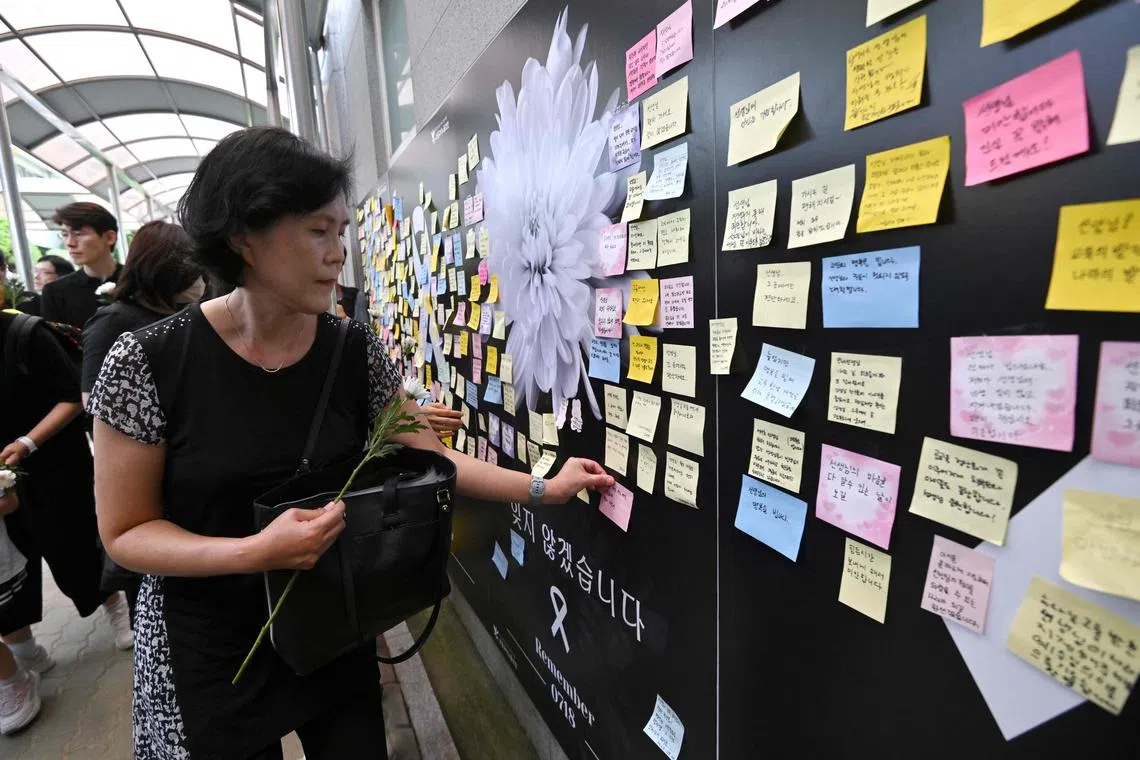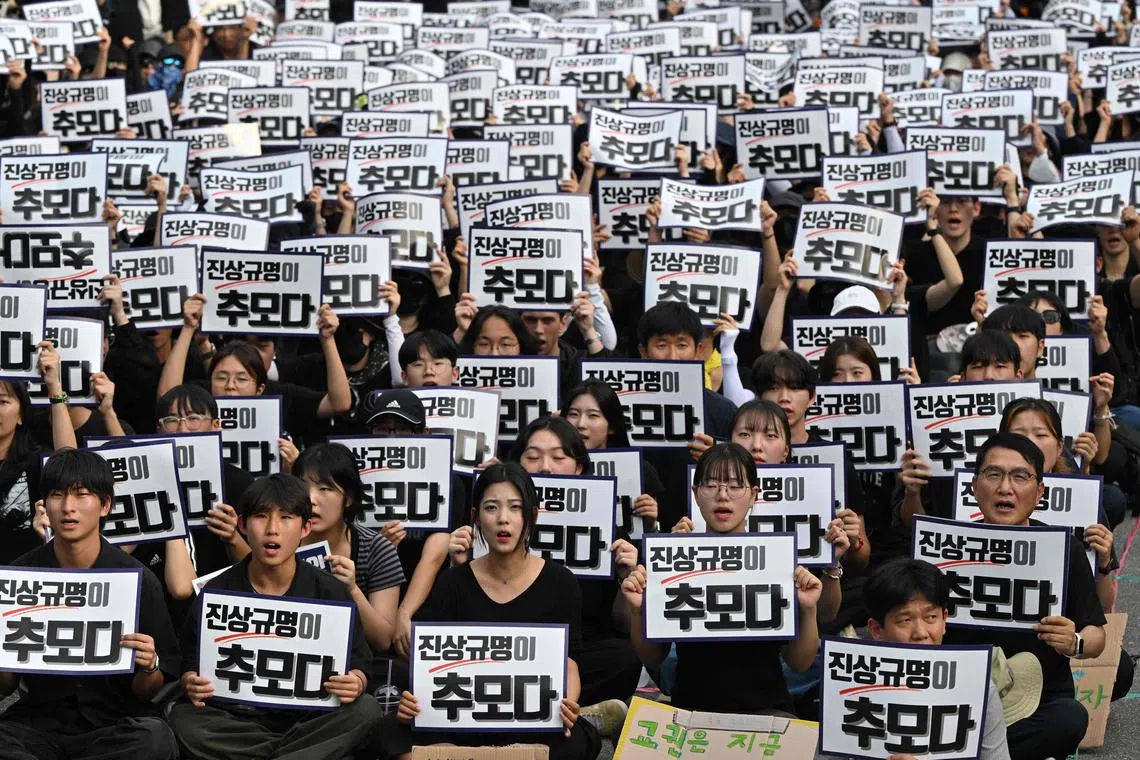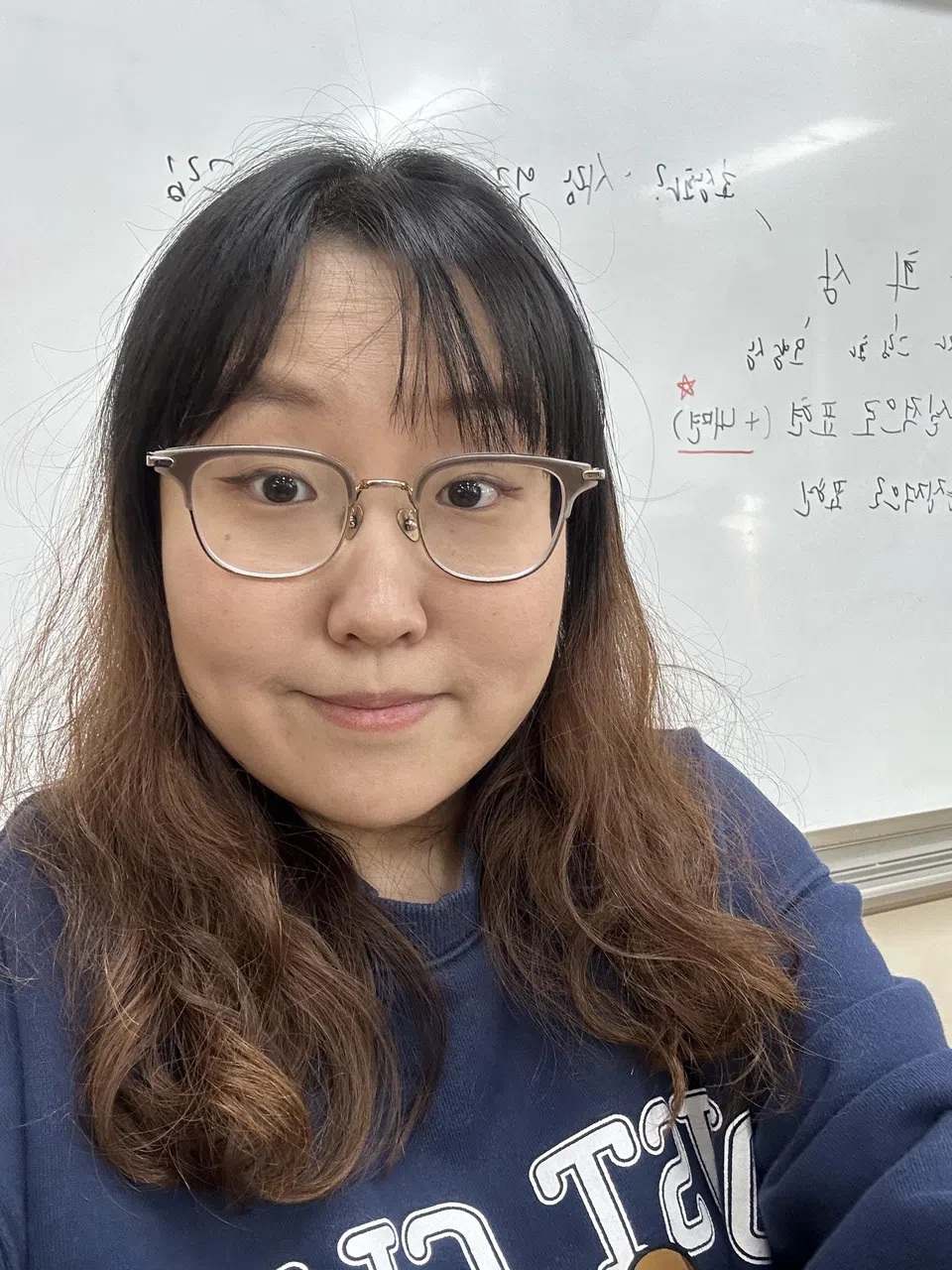Free mental health treatment for South Korean teachers amid suicide cases
Sign up now: Get insights on Asia's fast-moving developments

A mourner attaching a message on a memorial wall for an elementary school teacher who died in an apparent suicide in July at the Seoi Elementary School in Seoul.
PHOTO: AFP
Follow topic:
SEOUL – Teachers in South Korea will be eligible for free counselling under a new 10 billion won (S$10.3 million) government plan launched in response to mounting concerns over their mental health.
Under the plan announced on Friday by the Ministry of Education and Ministry of Health and Welfare, teachers will be eligible for free psychological tests and have their mental health treatments fully covered by the government.
The ministries said they see an urgent need for counselling and support to prevent teachers from falling into depression.
The initiative will run for the second school semester, from September till February 2024, after which the two ministries will jointly plan a fresh budget for the new school year.
Teachers may choose to take the mental health tests online, or seek help at national or private medical centres nationwide.
Mobile counselling buses will also be rolled out to schools so that teachers can get easier access to specialists. On the cards are psychological testing tools that will allow teachers to take stock of their mental health every two years.
“Teachers are the most crucial agents in the field of education, and their mental well-being is essential for the safe functioning of educational activities in schools,” Deputy Prime Minister and Minister of Education Lee Ju-ho said, adding that the joint task force will continue looking into efforts to help teachers.
Mr Lee’s ministry has come under fire after experts warned of a looming mental health crisis
The most high-profile suicide was that of a 23-year-old teacher who killed herself
The suicide sparked weekend rallies in the capital Seoul by teachers and supporters from all over the country, in support of greater protection of teachers’ rights.
They have also called for revisions to South Korea’s child welfare and abuse laws to put a stop to cases of parents filing malicious and unfounded complaints against teachers.

Protesters holding up signs reading “Revealing the truth is the way to pay respect” during a rally demanding the protection of teachers’ rights in front of the National Assembly in Seoul on Sept 4.
PHOTO: AFP
A survey of 3,505 teachers in August underlined the gravity of the situation: It found that four in 10 teachers reported severe symptoms of depression, while 16 per cent said they have had suicidal thoughts. Out of these, 4.5 per cent said they had gone to the extent of making specific plans to take their own lives but did not do so.
Respondents attributed the cause of their depression to the high number of phone and in-person consultations with parents, as well as complaints and the verbal and physical violence they suffered.
In the latest suicide case, an elementary school teacher from Daejeon city in central Korea had reportedly suffered years of harassment from parents.
The 42-year-old teacher, who had taught for 24 years, in 2019 made students who had been caught fighting apologise to the rest of their class. But the upset parents of the students involved lodged repeated complaints of child abuse against her – 14 over the past five years, said the Daejeon Metropolitan Office of Education.
Despite the charges being dropped as they were deemed to lack merit, the teacher came under immense stress and had to go for counselling. She attempted suicide on Sept 5 and died of her injuries two days later.
Her death has, in turn, led to a witch-hunt of the parents behind the malicious complaints, with people exposing their personal details on the Internet and targeting their businesses.
Public anger is at a high as more cases of teachers suffering abuse from parents come to light.
It is protection from such malicious complaints and accusations that teachers sorely need from the government, if the problem is to be solved, according to elementary school teacher Kang Hyun-ju.
Ms Kang, 27, has been undergoing monthly counselling sessions and is on six months’ medical leave after suffering a panic attack earlier in 2023 attributed to accumulated stress in dealing with disruptive students over her six years of teaching.

Teacher Kang Hyun Ju has had two mental breakdowns in her six-year teaching experience.
PHOTO: COURTESY OF KANG HYUN JU
She said her medical costs were mostly covered by the country’s national health insurance scheme, and she paid a total of about 200,000 won (S$205) after heavy subsidies. But other teachers could be suffering from more severe conditions and thus paying far more, she added.
“With this new plan, it shows that the Ministry of Education is finally paying attention to teachers’ mental health. They did not do so previously,” she said.
Nonetheless, she noted: “It is really, really important to find true solutions to our problems. Solve the problem that is making us teachers sick in the first place. Don’t just care for us only after we are wounded.”
Helplines
Mental well-being
Institute of Mental Health’s Mental Health Helpline: 6389-2222 (24 hours)
Samaritans of Singapore: 1800-221-4444 (24 hours) /1-767 (24 hours)
Singapore Association for Mental Health: 1800-283-7019
Silver Ribbon Singapore: 6386-1928
Tinkle Friend: 1800-274-4788
Chat, Centre of Excellence for Youth Mental Health: 6493-6500/1
Counselling
TOUCHline (Counselling): 1800-377-2252
TOUCH Care Line (for seniors, caregivers): 6804-6555
Care Corner Counselling Centre: 6353-1180
Counselling and Care Centre: 6536-6366
Online resources
carey.carecorner.org.sg
(for those aged 13 to 25)limitless.sg/talk
(for those aged 12 to 25)


